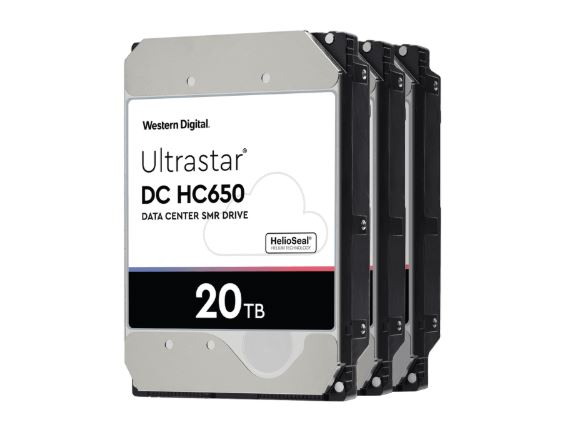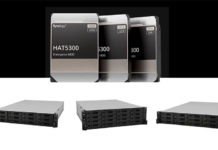If only this happened last year we could have said 20TB and 18TB in 2018. I digress. The news this week is that Western Digital is sampling its 20TB SMR and 18TB CMR hard drives to customers in 2019, with volume production ramping in the first half of 2020.
Western Digital Ultrastar DC HC650 20TB
The Western Digital Ultrastar DC HC650 20TB drive uses a total of nine internal disks and SMR technology to achieve new heights of storage capacity. SMR drives are not the drives that you want for your average FreeNAS server. Instead, they require host software management to make effective use of the drives. Further, they are optimized for sequential transfers rather than for random I/O. It is somewhat interesting that even years after hot data has transitioned to SSDs, SMR has not taken over the hard drive market. WD estimates that in 2023 half of its shipped capacity will be SMR so perhaps that is coming slowly. Instead, we still have random I/O optimized hard drives including Western Digital’s new 18TB CMR Ultrastar DC HC550.
Western Digital CMR Ultrastar DC HC550 18TB
With 18TB of capacity, the Western Digital CMR Ultrastar DC HC550 is a nine disk platform. Like the DC HC650, the DC HC550 is a helium-filled drive. By increasing capacities, the new drives will have a few key impacts. The cost to attach a TB of storage will drop. Each drive has a cost in terms of chassis, controllers, and power. Having larger drives means fewer drives to reach a given capacity and therefore lower TCO.
These are the drives that you are most likely to see in your company’s NAS server compared to the SMR alternatives.
Learning More
You can read the official WDC press release here but the details on the drives were surprisingly light for a hard drive announcement.




Awesome! (Larger drives should bring down the cost of 4-12 TB units from current levels, i.e., roughly $25-$30/TB; typically, 4 TB units for $120, 8 TB units for $240, etc…)
Also that means a single failure impacts a large amount of data too!! … especially if you are using these in situations without backups,etc
Abhishek, the risk of loosing large amount of data from a drivefailure, has always been the situation, from when disks were 20-200 MB to now that they are multi-TB, and will continue to be so when drives become dozens-TB pr drive. Your argument is flawed since you have the same risk of a drivefailure, if you store your data on a single disk, no matter if you have backup or not.
Who stores important data without backup ?!
ALWAYS have backup, no matter which drive you have…
Ne drivers will have some redundancy, at least some of them.
Like two heads per platter side etc.